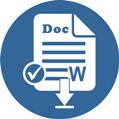Online Submissions
Already have a Username/Password for Proceeding of Youth Communication Day?
Go to Login
Need a Username/Password?
Go to Registration
Registration and login are required to submit items online and to check the status of current submissions.
Submission Preparation Checklist
As part of the submission process, authors are required to check off their submission's compliance with all of the following items, and submissions may be returned to authors that do not adhere to these guidelines.
- The submission has not been previously published, nor is it before another journal for consideration (or an explanation has been provided in Comments to the Editor).
- The submission file is in OpenOffice, Microsoft Word, RTF, or WordPerfect document file format.
- Where available, URLs for the references have been provided.
- The text is single-spaced; uses a 12-point font; employs italics, rather than underlining (except with URL addresses); and all illustrations, figures, and tables are placed within the text at the appropriate points, rather than at the end.
- The text adheres to the stylistic and bibliographic requirements outlined in the Author Guidelines, which is found in About the Journal.
- If submitting to a peer-reviewed section of the journal, the instructions in Ensuring a Blind Review have been followed.
Copyright Notice
License and Copyright Agreement In submitting the manuscript to YCD, the authors certify that: They are authorized by their co-authors to enter into these arrangements. The work described has not been formally published before, except in the form of an abstract or as part of a published lecture, review, thesis, or overlay journal. Please also carefully read YCD's Posting Your Article Policy at http://seminar.uad.ac.id/index.php/YCD/about/editorialPolicies#custom-5 That it is not under consideration for publication elsewhere, That its publication has been approved by all the author(s) and by the responsible authorities – tacitly or explicitly – of the institutes where the work has been carried out. They secure the right to reproduce any material that has already been published or copyrighted elsewhere. They agree to the following license and copyright agreement. Copyright Authors who publish with YCD agree to the following terms: Authors retain copyright and grant the proceedings right of first publication with the work simultaneously licensed under a Creative Commons Attribution License (CC BY-SA 4.0) that allows others to share the work with an acknowledgment of the work's authorship and initial publication in this proceedings. Authors are able to enter into separate, additional contractual arrangements for the non-exclusive distribution of the proceedings's published version of the work (e.g., post it to an institutional repository or publish it in a book), with an acknowledgment of its initial publication in this proceedingsl. Authors are permitted and encouraged to post their work online (e.g., in institutional repositories or on their website) prior to and during the submission process, as it can lead to productive exchanges, as well as earlier and greater citation of published work. Licensing for Data Publication YCD use a variety of waivers and licenses, that are specifically designed for and appropriate for the treatment of data: Open Data Commons Attribution License, http://www.opendatacommons.org/licenses/by/1.0/ (default) Creative Commons CC-Zero Waiver, http://creativecommons.org/publicdomain/zero/1.0/ Open Data Commons Public Domain Dedication and Licence, http://www.opendatacommons.org/licenses/pddl/1-0/ Other data publishing licenses may be allowed as exceptions (subject to approval by the editor on a case-by-case basis) and should be justified with a written statement from the author, which will be published with the article. Open Data and Software Publishing and Sharing The proceeding strives to maximize the replicability of the research published in it. Authors are thus required to share all data, code or protocols underlying the research reported in their articles. Exceptions are permitted but have to be justified in a written public statement accompanying the article. Datasets and software should be deposited and permanently archived inappropriate, trusted, general, or domain-specific repositories (please consult http://service.re3data.org and/or software repositories such as GitHub, GitLab, Bioinformatics.org, or equivalent). The associated persistent identifiers (e.g. DOI, or others) of the dataset(s) must be included in the data or software resources section of the article. Reference(s) to datasets and software should also be included in the reference list of the article with DOIs (where available). Where no domain-specific data repository exists, authors should deposit their datasets in a general repository such as ZENODO, Dryad, Dataverse, or others. Small data may also be published as data files or packages supplementary to a research article, however, the authors should prefer in all cases a deposition in data repositories.
Privacy Statement
The names and email addresses entered in this journal site will be used exclusively for the stated purposes of this journal and will not be made available for any other purpose or to any other party.

